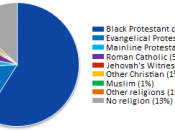World War II affected almost every aspect of American life. The 1930's marked a decade of economic hardship. In 1930, the Great Depression deepened and millions of Americans were forced out of their homes and jobs, equaling little money to support their families. Despite the numerous government agencies created by President Roosevelt, which produced thousands of jobs, many Americans felt hopeless. The rich were getting richer, and the opportunities and prospects of America's poor became grimmer. American morale was at an all time low since the days of the Civil War.
With the first sign of war, American's took a stand of neutrality. However, the worldwide destruction that 's Army unleashed made it increasingly difficult for America to remain a neutral nation. Before officially entering WWII, America monetarily aided Britain, France and the Soviet Union through the Lend-Lease Act. After the ing of Pearl Harbor, Roosevelt created the War Production Board where he appointed the executive vice president of Sears- Roebuck, Donald Nelson, to organize the nation's resources for an all-out war effort.
Roosevelt believed that "in a capitalist country, you have to let business make money out of the process [of war] or business won't work." Roosevelt also believed in the close collaboration of business and government.
The partnership of big science, government, and big business established in the1940 has created a firm foundation for future projects. Scientists were commissioned to perfect new weapons and other products. In addition to the development of the atomic , American scientists also improved radar, developed jet engines, and penicillin. During WWII business executives were offered key positions under Roosevelt in an effort to unite industry with government. Because of collaboration with the government, industrial production and corporate profits nearly doubled, as they found demand in markets that previously had not existed. The Office of Price Administration was established as an effort to control inflation. The commercial farming industry also profited from the war. The consolidation of small farms into larger commercial farms, as well as the rise in demand for fertilizer, led to a rapid increase of profit. Americans reacted to the crisis of WWII effectively and efficiently. They created the hardware and supplies that turned the tide of the war, and had 's armies marching back toward Berlin, and the Japanese island hopping in the Pacific back to Tokyo. From airplane to rubber factories, eager Americans flooded the work force, and for the first time in years, there was nearly no unemployment rate in America.
President Roosevelt pro-actively enlisted the forces needed, both militarily and domestically, to keep Americans behind the war effort. The government sold $135 billion in war bonds. The American Red Cross was inundated with volunteers. Even small children helped by collecting scraps. It is safe to say that despite the ly occurring in Europe and the South Pacific, American morale greatly rose with WWII.
Although discrimination did not fully end, minorities and women found many new opportunities. By the end of the war, 19.5 million women were in the work force. Most were married, and they worked to keep themselves busy while their sons and husbands were away. At the end of the war, women were advised to leave work and continue their more traditional role of wife and mother. African Americans improved their economical standing by accepting war industry positions and through migration from the south, some became professionals and some skilled workers but despite the Presidents issuance of Executive Order 8802 and The Fair Employment Practices Commission, African Americans continued to face harsh discrimination. Like African Americans, Mexican-Americans were offered wartime opportunities, but they were also subjected to racial prejudice. Violent situations arose due to increased migration.
World War II affected the social lives of many Americans in countless ways. Work ethics were enhanced and unemployment rates reached an all time low. Leisure time consisted of hours in front of the radio and movie watching. As with World War I, World War II created a massive migration of southerners in search of industrial opportunities.
Despite a large amount of American casualties, the United States was credited with victory, and due to the drive and determination of its people, America emerged from the shambles of war as the world's leading industrial nation. Americans were optimistic of even more economic growth following the war. For the first time, Americans experienced a level of materialistic comfort. The working class was earning more income, due in part to the successful lobbying of numerous unions. Most Americans could safely say they were living the "American Dream."





